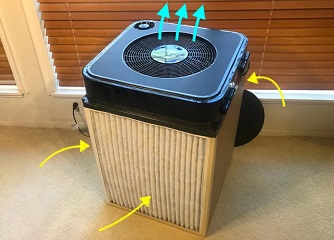BREAKING Medical News! UK Study Finds That Air Purifiers Do Not Prevent Respiratory Infections!
Nikhil Prasad Fact checked by:Thailand Medical News Team Nov 24, 2023 2 years, 2 months, 4 weeks, 1 day, 18 hours, 56 minutes ago
Medical News: In the wake of the COVID-19 pandemic, concerns about indoor air quality skyrocketed, prompting widespread calls for improved ventilation and the use of air purifiers. The belief was that these measures would mitigate the risk of respiratory infections, particularly the transmission of the virus. However, a groundbreaking study conducted in the UK has shed light on a startling revelation – air purifiers may not be the panacea they were believed to be.
 The Study's Origins and Scope
The Study's Origins and Scope
Researchers from the University of East Anglia, University College London, University of Essex, Norfolk and Norwich University Hospital Trust, and University of Surrey collaborated on a comprehensive review spanning from 1970 to 2022. The study, titled "Effectiveness of filtering or decontaminating air to reduce or prevent respiratory infections: A systematic review," covered in this
Medical News report, aimed to evaluate the real-world effectiveness of various air treatment technologies in preventing respiratory and gastrointestinal infections.
Types of Air Treatment Technologies
The study focused on two main types of air treatment devices: filters and air disinfectors. Filters operate by removing particles from the air that may contain infectious viruses, while air disinfectors use ultraviolet radiation or ozone to inactivate viruses in the air.
Review Findings - Lack of Convincing Evidence
The researchers uncovered a total of 32 observational and experimental studies conducted over the decades, and their findings were unequivocal. The evidence did not support the claims that air treatment technologies, including both filters and disinfectors, significantly reduce either the frequency or severity of respiratory infections.
While there seemed to be a trend towards fewer laboratory-confirmed influenza or norovirus infections, the study exposed a concerning issue - publication bias. This bias, where positive results are more likely to be published than negative ones, skewed the apparent impact of air treatment technologies, making them seem more effective than they truly were.
Addressing COVID-19 Specifically
While none of the studies directly focused on COVID-19, the researchers pointed to a recent German study published in July that specifically investigated the impact of high-efficiency particulate air (Hepa) filters on COVID-19 in kindergartens. Surprisingly, the study found no significant difference in infection rates between schools with new filters installed and those without. In fact, infection rates were slightly higher in schools equipped with the filters.
https://bmjopen.bmj.com/content/13/7/e072284
Overlooking Ventilation in the Equation
The UK study did not delve into the research on ventilation, such as keeping windows open, as a potential factor in reducing the risk of illness. However, the researchers acknowledged the possibility that reduced ventilation rates in some studies examining air treatme
nt technologies could have increased the risk of infection. To address this, they referred to a recent systematic review on the effect of ventilation on COVID-19, which found a bit more evidence supporting ventilation's role in reducing infection. However, the overall quality of these studies was deemed poor, leading to low confidence in the conclusion.
Why Air Treatment Technologies Fall Short
The study's lead researcher pointed out several reasons why air treatment technologies may not be the magic bullet for preventing respiratory infections.
Firstly, the transmission risk of respiratory viruses is highly dependent on proximity to an infected person, and air treatment may not significantly impact close person-to-person transmission.
Secondly, people regularly move between spaces, rendering air treatment in specific locations ineffective in protecting individuals in other environments.
Lastly, the unique epidemic dynamics of infections with short-duration immunity, such as COVID-19, contribute to the limitations of air treatment technologies. The SEIRS model, which considers individuals as susceptible, exposed, infected, recovered, and susceptible again, highlights the diminishing effectiveness of interventions like air filtration or mask-wearing as reinfections become more prevalent.
Systematic Review Highlights
The systematic review provided a comprehensive analysis of worldwide observational and experimental studies, encompassing various air treatment technologies and study designs. Notably, the pooled data from 32 studies suggested no significant benefits of air treatment technologies for symptom severity or presence in the absence of confirmed infection.
While some technologies showed a potential reduction in infection incidence, such findings were tainted by evidence of strong publication bias. The conclusion emphasized that, despite reductions in environmental and surface samples, robust real-world evidence supporting the effectiveness of air treatment technologies in preventing respiratory or gastrointestinal infections is yet to emerge.
Looking Ahead: Trials, Cost, and Recommendations
The study highlighted the need for rigorous experimental trials to substantiate the effectiveness of air treatment technologies. Ongoing cluster randomized controlled trials in different countries, evaluating both HEPA and germicidal ultraviolet light (GUVL), are expected to provide valuable insights.
The review also acknowledged the financial implications, emphasizing the expense associated with air treatment technologies. The limited resources in the realm of medical and public health interventions underscore the importance of including data on implementation costs, operational costs, and energy efficiency in published evaluations.
In conclusion, the study findings from this UK study challenges the widely held belief in the efficacy of air purifiers in preventing respiratory infections. As the world grapples with ongoing health challenges, the study calls for a reevaluation of strategies and a cautious approach to the implementation of air treatment technologies until further evidence emerges from ongoing trials and research.
The study findings were published in the peer reviewed journal: Preventive Medicine.
https://www.sciencedirect.com/science/article/pii/S0091743523003602
For the latest
Medical News, keep on logging to Thailand Medical News.
